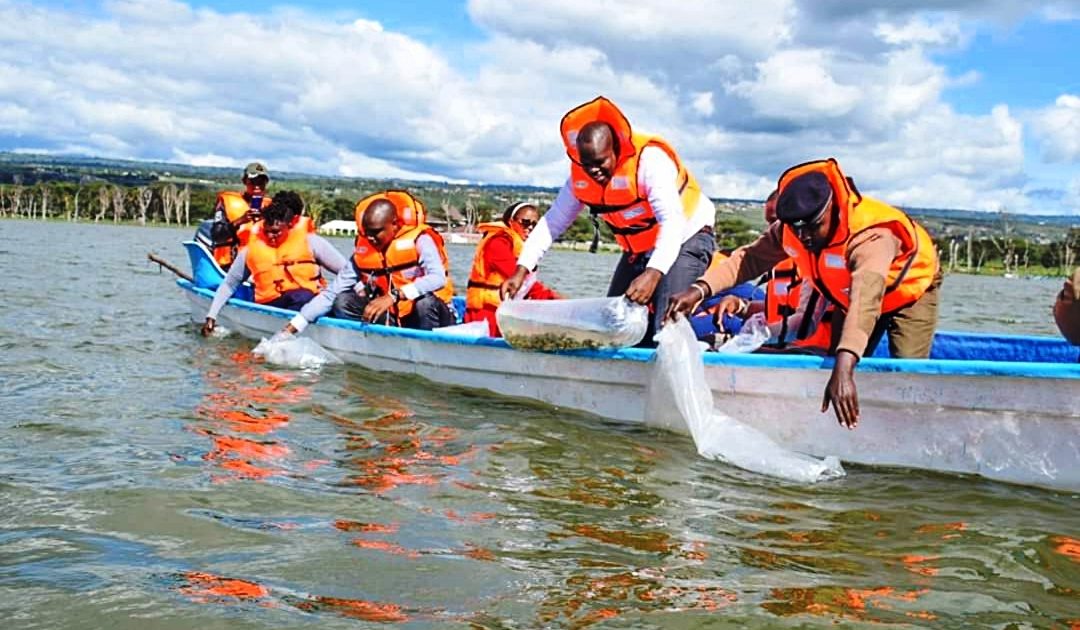Nakuru county government has restocked Lake Naivasha with Tilapia fingerlings worth over Sh 2.5million in a bid replenish the dwindling fish stocks in the fresh water body.
Speaking in Naivasha on Tuesday during the restocking in an event in which the World Fisheries` Day (WFD) was also commemorated, Nakuru County Executive Committee Member (CECM) for Agriculture, Livestock, Fisheries and Cooperatives Leonard Bor said his office was working with relevant stakeholders to curb illegal fishing which has become rampant on the Lake.
He said that his office was coming up with Bills and policies to help improve the fisheries sector in the county and help improve the livelihoods of the fisher folk in the area.
During the event where 150,000 fingerlings were released into the lake, the County government also handed over two modern fishing boats to Karagita Beach Management Unit (BMU)
Speaking during the event, Kenya Marine and Fisheries Research Institute (KEMFRI) Director in charge of the Naivasha office Edna Waithaka voiced concern about fishing of immature fish stocks by the fisher folks who she said were using undersize nets.
She warned them against this practice and urged them to stop forthwith as this hinders regeneration of fish stocks in the lake and reminded the fishermen that immature fish fetch low prices in the market.
“By removing young stocks from the Lake, you deny the fish stocks opportunity to rejuvenate themselves and give you more stocks,” Ms Waithaka said.
Since the inception of devolved units, the County has not closed the lake to allow for regeneration of fish stocks but has however been doing restocking of the lake every year. This then allows for continued economic activities on the lake and sustainable livelihoods of traders, fishermen, and other stakeholders.
But the fisher folk on Lake Naivasha have voiced concern over excessive abstraction of water from the Lake by flower farms thus affecting the fishing activities.
Led by the Beach Patrol Leader, Ms Grace Kimani, the fisher folk said some of the flower farms were using very large pipes to draw water for their farming activities thus affecting the water levels in the lake that was already being affected by the recent long drought that ravaged the country.
Ms Kimani said the flower farms had also encroached and blocked various corridors making it difficult for them and even wildlife to access the fresh water lake.
Naivasha produces about 70 per cent of all cut flowers exported from the country annually and the flower farms are concentrated around Lake Naivasha.
Ms Kimani alleged that there were cartels who were monopolising fishing activities on the lake and also funding youth to carry out illegal fishing. This, she said had led to depletion of fish stocks.
Siltation and environmental degradation, she said had led to near disappearance of some fish varieties like black bass through destruction of the papyrus reeds which are its breeding grounds.
Kimani cited insecurity on the Lake where even the Coast guards who man the lake have been attacked and injured by unknown gangs.
The fisher folks appealed to the county government to help them with funding to venture into aquaculture in order to ease pressure on the lake.
They also want Lake cleaning to be included in the county’s budget in order to make it regular and enhance patrols to protect the fish breeding grounds from illegal fishermen.
The county government is already constructing a state-of-the-art fish market at the Karai area along the busy Nakuru – Nairobi highway to boost the market while addressing sanitation issues and fish handling at a cost of Sh 239 million. The market is expected to revolutionise the fish trading business, boost fish prices and provide tens of job opportunities to local youths.
Currently, there are 300 licensed fishing boats manned by youth groups to ensure increased employment opportunities while also ensuring sustainable exploitation of the fisheries resources.
The county has only five fish landing beaches including Central beach, Karagita, Kamere, Tarambete and Oloiden. But only Central beach had been gazetted leaving the other four without legal and official land documents.
The county as at December last year recorded fish catch weighing a total of 2,045,856 kilogrammes with an estimated market value of Sh248Million. Tilapia species is the most common fish according to the data captured.
The lake has for years been supporting thousands of families who depend on the lake resources while contributing to the economic development of the lakeside town.
Only five species of fish are present on the lake, all of which have been introduced. They are Oreochromis leucostictus, Tilapia zillii, Micropterus salmoides (largemouth bass), Barbus amphigramma and Poecilia reticulata (guppy).
The fresh water lake is 139 square kilometres. Some of the challenges facing the water body are; massive pollution, human encroachment and abstraction.
According to the department of Fisheries, Kenya’s overall fish production was predicted to be 163,600 metric tonnes in 2021 due to the dwindling stocks in her water bodies, with aquaculture accounting for 2.7 per cent and the annual supply gap of 50,000 metric tonnes of fish is projected to increase to 75,000 by 2030 if annual per capita fish consumption remains constant at 4.3 kg.
By Mabel Keya Shikuku




